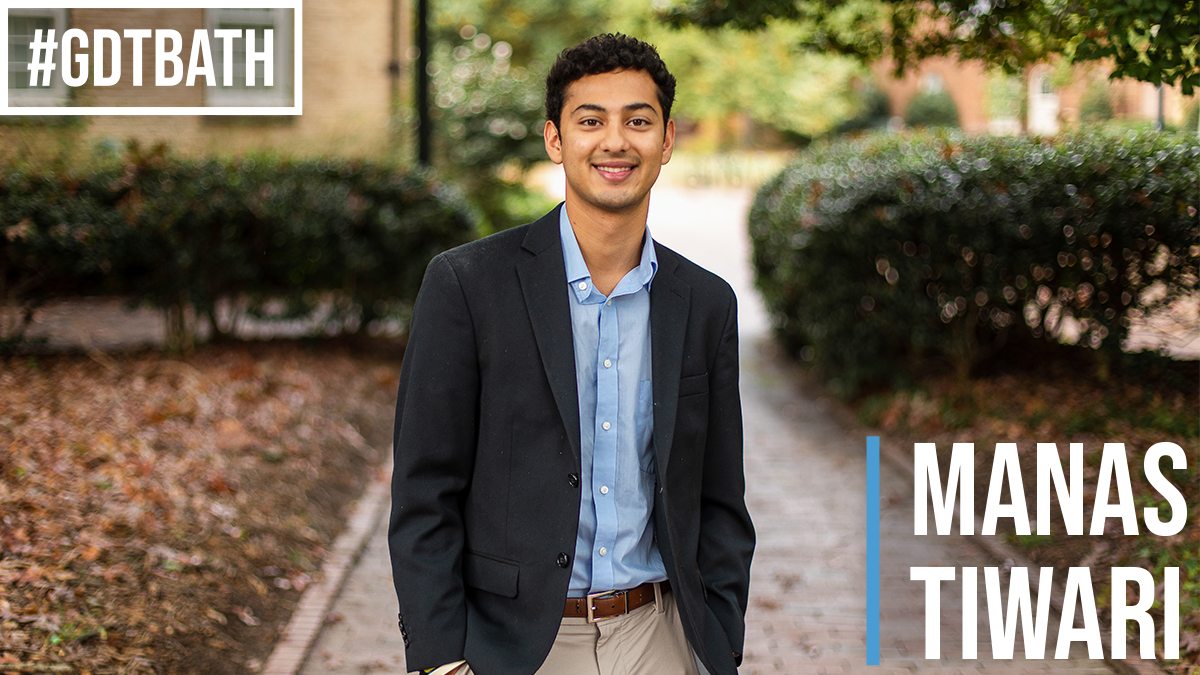#GDTBATH: Manas Tiwari
When many of his career and resume-building experiences were put on pause because of the pandemic, Manas Tiwari was searching for a way to get hands-on experience to prepare for medical school. The Carolina COVID-19 Student Services Corps became his perfect outlet.

Manas Tiwari had his path to medical school and a career as an orthopedic surgeon all planned.
He’d come to Carolina to study biostatistics and then get real-world experience by shadowing doctors and working internships. But when the pandemic began in the middle of his sophomore year, many of those career and resume-building experiences were out of reach.
“I pretty much spent that summer taking summer classes and was frustrated that there was nothing else I could really be doing while also keeping myself and my family safe,” Tiwari said.
Then, during the fall 2020 semester, Tiwari found his way to get the hands-on experience he’d been seeking while also helping the University respond to the pandemic.
“When I saw the opportunity for the Carolina COVID-19 Student Services Corps, I definitely jumped on it because I felt like there was finally something that I could do about COVID, and I felt like it was a great way to make an impact and leave my mark on Carolina — by being able to address the need in our community,” he said.
The Carolina COVID-19 Student Services Corps is a volunteer program made up of undergraduate and graduate students who work on various service opportunities related to COVID-19 relief in the Carolina and Chapel Hill communities. Since the program launched last fall, 1,500 Tar Heels have served more than 27,000 hours with the corps.
Tiwari’s role was to organize virtual volunteers and lead a team of 250 students to validate vaccine information submitted by the Carolina community. He also helped streamline the Carolina Together Testing Program’s email communications by compiling a list of frequently asked questions and creating template responses so that volunteers could assist students faster.
“With much of my volunteer work being online, it was new and exciting because I met a lot of new friends through constant communication over Zoom and email,” he said. “We built a close-knit family of students who cared for the community through the Carolina CSSC, and all together, we were able to contribute in fighting COVID.”
As a member of the Carolina COVID-19 Student Services Corps’ executive board, Tiwari also helps fill in with various other volunteer opportunities, including working at the Carolina Together Testing sites on campus. That was a pivotal opportunity for the Tar Heel.
“I could tell that this is real,” Tiwari said. “What I’m doing is actually making a difference. It’s going to help people, and it’s helping stop the spread of COVID at Carolina. Seeing the little things in health care, like providing a COVID test, that can really make a difference, I think, solidified me wanting to go into health care.”
An added benefit of volunteering with the Carolina COVID-19 Student Services Corps was that Tiwari had access to and mentorship from health care professionals who have spent decades honing their skills and were eager to pass that knowledge along to the next generation.
Tiwari and his team members have been operating under the tutelage of Meg Zomorodi, the UNC School of Nursing assistant provost and director of the Office of Interprofessional Education and Practice, who has helped lead the volunteers and guide them through challenges. That mentorship led to the program and the Office of Interprofessional Education and Practice recently being awarded the National Center for Interpersonal Practice and Education’s George E. Thibault Nexus Award for interprofessional collaboration.
The collaboration and mentorship through the Carolina COVID-19 Student Services Corps have been vital for Tiwari because it has provided the hands-on experience he was seeking and gave him the opportunity to help his community.
“I learned a lot from this experience,” he said. “This was really my first student-leader experience at such a large scale. I feel like I have grown. I think my ability to speak to other people has grown tremendously, especially in a leadership setting. Being a leader for this organization has really meant a lot to me because I could see the moving parts and see how what we’re deciding and what we’re actually doing affects the whole Carolina population.”




